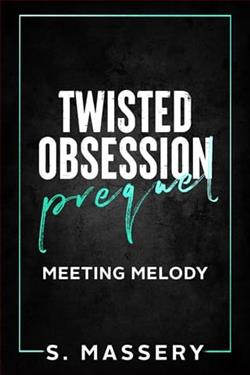Page 115 of Veil of Smoke
“We are,” I say, my voice steady, meaning it deeper than she knows. Open to this, to me, to what we’ve built from ash.
She nods, drifting toward a shelf of daisies, and I watch her, the sunlight catching flecks of dust in the air. The shop feels alive, not perfect, but ours.
Dario pushes through from the back, grease streaking his shirt, a duffel bag slung over his shoulder. “You got five crates of ‘vintage ceramic’ on the truck,” he says, his voice rough but warm.
I lift a brow, leaning on the table. “Let me guess. Venetian. Smuggled out before someone noticed.”
“They fell off a dock,” he says, deadpan, adjusting the bag. “Right into our possession.”
I catch his eye, and we trade a look—half exasperation, half delight. Saints we’re not, but builders we’ve become, piecing this life together crate by crate.
The customer glances over, curious, and I turn back to the lilies, trimming a stem with quick, sure cuts. The shop hums around me, fresh paint gleaming on the walls, jars of color lining every shelf.
I used to think beauty was a lie, a mask over the rot. Now I see it clear, fragile but real, blooming where it shouldn’t.
The breeze kicks up outside, tugging at the awning, and I hear the chimes again, their song light against the morning. I set the shears down, wiping my hands on my jeans.
Dario drops the duffel by the counter, his boots scuffing the floor. I feel him behind me, a steady presence, and it’s enough, more than I once dared hope.
The customer picks up a jar of basil, sniffing it with a small grin. “What’s the new name mean?” she asks, turning to me, her voice bright with curiosity.
I lean on the table, feeling the wood under my palms, solid and worn. “It means we don’t hide the fire anymore,” I say, my voice clear. “We grow from it.”
She nods, like it makes sense, and I feel it too, the truth of that name, carved from what we’ve built.
Dario steps past, brushing my temple with a quick kiss, his lips warm against my skin. “And we make rent doing it,” he says, hefting a crate from the back, his grin sly.
I smirk, watching him move, the grease on his shirt catching the light. The customer laughs soft, turning back to the basil, and I feel the shop settle, a rhythm we’ve found.
The tiger lilies stand tall in their vase, orange petals curling bold, and I trace one, feeling its texture, its quiet defiance. This is mine, ours, a bloom I didn’t expect.
I step to the counter, pulling a ledger—not Caldera’s, but ours—from under it. Ink marks orders, deliveries, small steps forward, and I smile, faint but real.
Dario grunts as he sets the crate down, ceramic clinking inside. “Heavy bastards,” he mutters, wiping his hands on his jeans, and I catch the glint in his eye.
“Worth it,” I say, leaning on the counter, my voice light. “If they’re real.”
“They’re real enough,” he says, smirking, and I feel the ease between us, sharp and warm, a thread we’ve woven tight.
The customer drifts to the marigolds, her fingers brushing their golden heads, and I watch her, the shop framing her like a picture I’ve painted from scratch.
I used to think stability was a trap, a cage dressed up pretty. Now it’s this, a storefront with my name on it, a life I’ve chosen, not one I’ve run from.
The chimes ring again, soft and clear, and I feel the breeze slip through the open door, carrying the scent of spring, clean and green.
Dario steps closer, peering into the crate, and I see the grease smudge on his cheek, the way his hands move, sure and steady. He’s here, with me, and it fits.
I trim another stem, the snip crisp in the quiet, and set it beside the lilies, a marigold bright against the orange. They clash, but they work, like us.
The customer turns, holding the basil jar. “I’ll take this,” she says, her smile waking up, and I nod, ringing it up on the old register.
“First sale,” I say, handing her the jar, my voice steady, a small triumph humming through me.
She grins, heading out, and the door swings shut behind her, the chimes tinkling soft. I lean back, feeling the counter under my elbows, solid and real.
Dario unpacks the crate, pulling out a chipped vase, its glaze cracked but gleaming. “Not bad,” he says, holding it up, catching the light.
“Not bad at all,” I say, stepping beside him, my shoulder brushing his.















